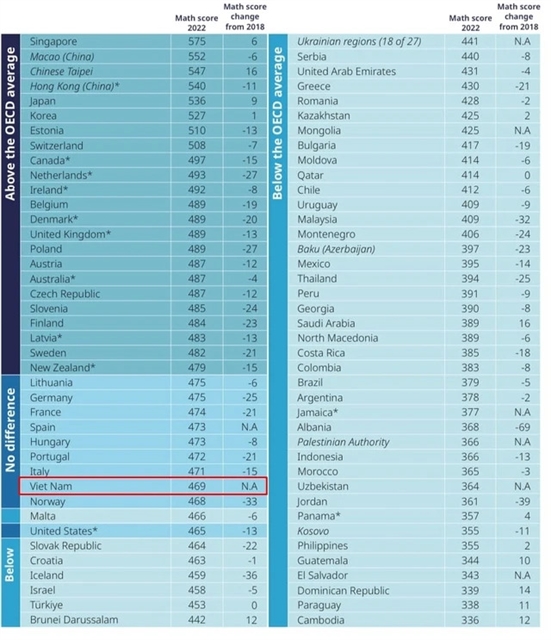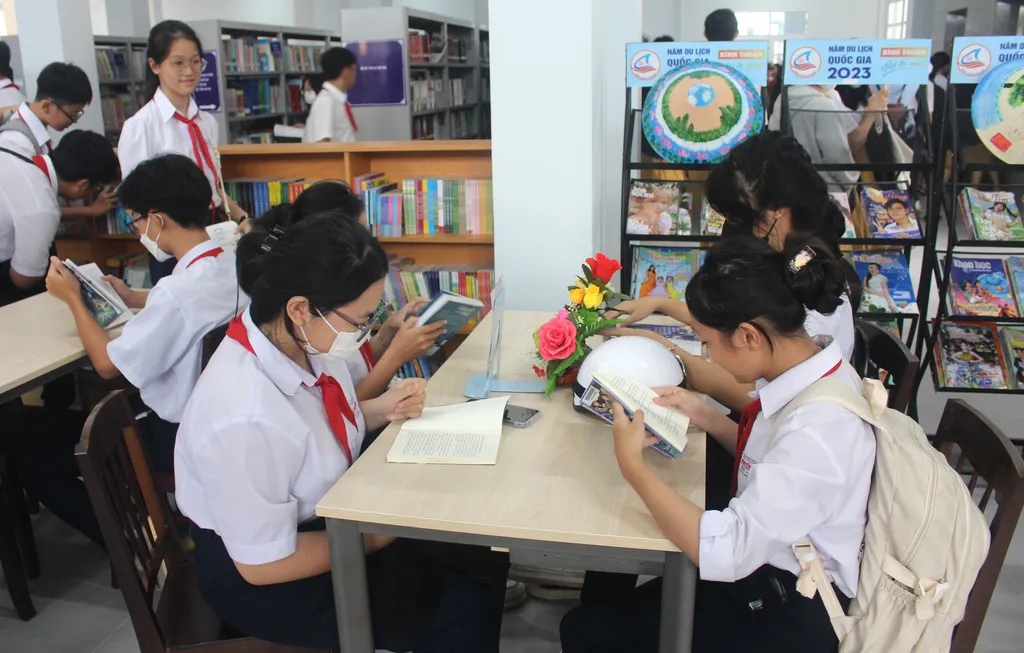 Society
Society

 |
| The OECD findings show that Vietnamese students achieved scores of 469 points in mathematics. |
HÀ NỘI — The recently unveiled Programme for International Student Assessment (PISA) 2022 results from the Organisation for Economic Co-operation and Development reveal a decline in rankings for Vietnamese students when compared to the most recent assessment in 2018 and the two preceding evaluations.
The OECD findings show that Vietnamese students achieved scores of 469 points in mathematics, 462 points in reading comprehension, and 472 points in science, marking a decrease of three to 14 points in comparison to the OECD average.
Since 2018, Vietnamese students have witnessed a decline in their average mathematics score by 27 points, with reading comprehension and science experiencing reductions of 43 and 71 points, respectively.
Regarding rankings, Vietnamese students demonstrate an average performance in mathematics but fall below average in reading comprehension and science. Specifically, out of the 73 countries and eight territories participating in PISA 2022, Việt Nam holds 31st position in mathematics, 34th in reading comprehension, and 37th in science.
Since Việt Nam's debut in PISA rankings in 2012, this year's outcomes mark the lowest rankings, with declines observed in all subject areas. Notably, mathematics scores have fallen by seven to 14 rankings, reading comprehension by two to 21, and science by 27 to 31 rankings.
The Programme for International Student Assessment (PISA) serves as a global benchmark for evaluating the proficiency of 15-year-old students in mathematics, reading, and science. It is designed to measure their ability to solve intricate problems, think critically and communicate effectively, providing invaluable insights into the efficacy of education systems in preparing students for real-life challenges and future success. While Việt Nam participated in PISA for the first time in 2012, caution is advised when comparing results as PISA 2022 results are not directly comparable to earlier outcomes.
Subjects' proficiency in Việt Nam
In mathematics, 72 per cent of Vietnamese students achieved at least Level 2 proficiency, surpassing the OECD average of 69 per cent. This implies that these students can interpret and recognise, without direct instructions, how a simple situation can be represented mathematically. However, only 5 per cent of Vietnamese students reached top performer status (Level 5 or 6), contrasting with leading Asian countries such as Singapore, Chinese Taipei, and Macao (China), where a significantly higher percentage achieved this level of proficiency.
Vietnamese students exhibited commendable reading proficiency, with 77 per cent attaining Level 2 or higher, exceeding the OECD average of 74 per cent. However, only 1 per cent achieved top performer status (Level 5 or higher) in reading. Comparatively, this contrasts with Singapore, where 89 per cent of students attained at least Level 2 proficiency, and 7 per cent reached top performer status.
In science, 79 per cent of Vietnamese students achieved at least Level 2 proficiency, surpassing the OECD average of 76 per cent. However, only 2 per cent reached top performer status (Level 5 or 6), highlighting room for improvement compared to other high-performing Asian countries.
The unique circumstances of PISA 2022, delayed by a year due to the COVID-19 pandemic, brought occasional challenges in data collection. Nevertheless, Việt Nam met all technical standards for the assessment. However, the review revealed limited comparability in reading results with other countries, cautioning against drawing direct trend comparisons.
Within Việt Nam, socio-economic status played a pivotal role in educational performance. Approximately 34 per cent of students were in the bottom international quintile of the socio-economic scale, indicating significant disadvantages. Interestingly, socio-economically advantaged students outperformed disadvantaged peers by 78 score points in mathematics, a difference smaller than the OECD average.
Boys outperformed girls in mathematics, while girls surpassed boys in reading. Globally, the gender differences were consistent, with boys generally outperforming girls in mathematics and vice versa in reading.
 |
| Students reading at Bình Thuận Province's Library. —VNA/VNS Photo Hồng Hiếu |
Support and discipline
In Việt Nam, a commendable 77 per cent of students reported that their mathematics teachers show genuine interest in every student's learning, surpassing the OECD average of 63 per cent. Furthermore, an impressive 83 per cent of students noted that teachers provide extra help when needed, compared to the OECD average of 70 per cent. These figures have seen minor fluctuations since 2012, showcasing a consistent commitment to student support in mathematics education.
Despite these positive indicators, around 11 per cent of students reported challenges in working effectively in most or all mathematics lessons, suggesting a need for further improvements. Additionally, 14 per cent of students admitted to getting distracted by digital devices, and 13 per cent by peers using such devices. Addressing these distractions is crucial for maintaining a focused learning environment.
The recently released PISA 2022 results also shed light on various aspects of mathematics education in Việt Nam, providing valuable insights into teaching approaches, classroom environments, students' feelings of safety, and parental involvement.
Student well-being
Despite the academic focus, PISA 2022 also delved into students' sense of belonging at school and overall life satisfaction. In Việt Nam, 85 per cent reported making friends easily, and 82 per cent felt a sense of belonging at school. However, 14 per cent reported feeling lonely, and 21 per cent felt like an outsider. Notably, students' satisfaction with life in Việt Nam declined, contrasting with a global trend of decreased satisfaction in many countries.
The PISA 2022 data revealed that students' performance tends to be higher in education systems where students feel safe and have an improved sense of belonging. In Việt Nam, 11 per cent of students expressed not feeling safe on their way to school, while 5 per cent reported feeling unsafe in their classrooms. Notably, 16 per cent of students did not feel safe in other areas at school, such as hallways, cafeterias or restrooms.
Concerningly, 17 per cent of girls and 19 per cent of boys reported being victims of bullying acts at least a few times a month. However, these figures represent a decrease from 2018, aligning with the global trend of reduced incidents of bullying. It's imperative to continue fostering a secure and supportive school environment to ensure the well-being of all students.
Parental involvement
PISA data collected from school principals highlighted a notable trend in parental involvement in Việt Nam. Despite a global decline in parental engagement, Việt Nam witnessed a stable scenario. In 2022, 62 per cent of students attended schools where at least half of all families discussed their child's progress with a teacher on their initiative, compared to 73 per cent in 2018. Systems with more positive trends in parental involvement correlated with more stable or improved performance in mathematics.
These findings underscore the importance of a collaborative approach involving educators, students, and parents. While Việt Nam showcases strengths in teacher support and commitment to improvement, addressing distractions and ensuring students' safety remain pivotal for a holistic and effective mathematics education system. Continuous efforts in these areas will contribute to creating an optimal learning environment for students, fostering a passion for mathematics and lifelong learning. — VNS




